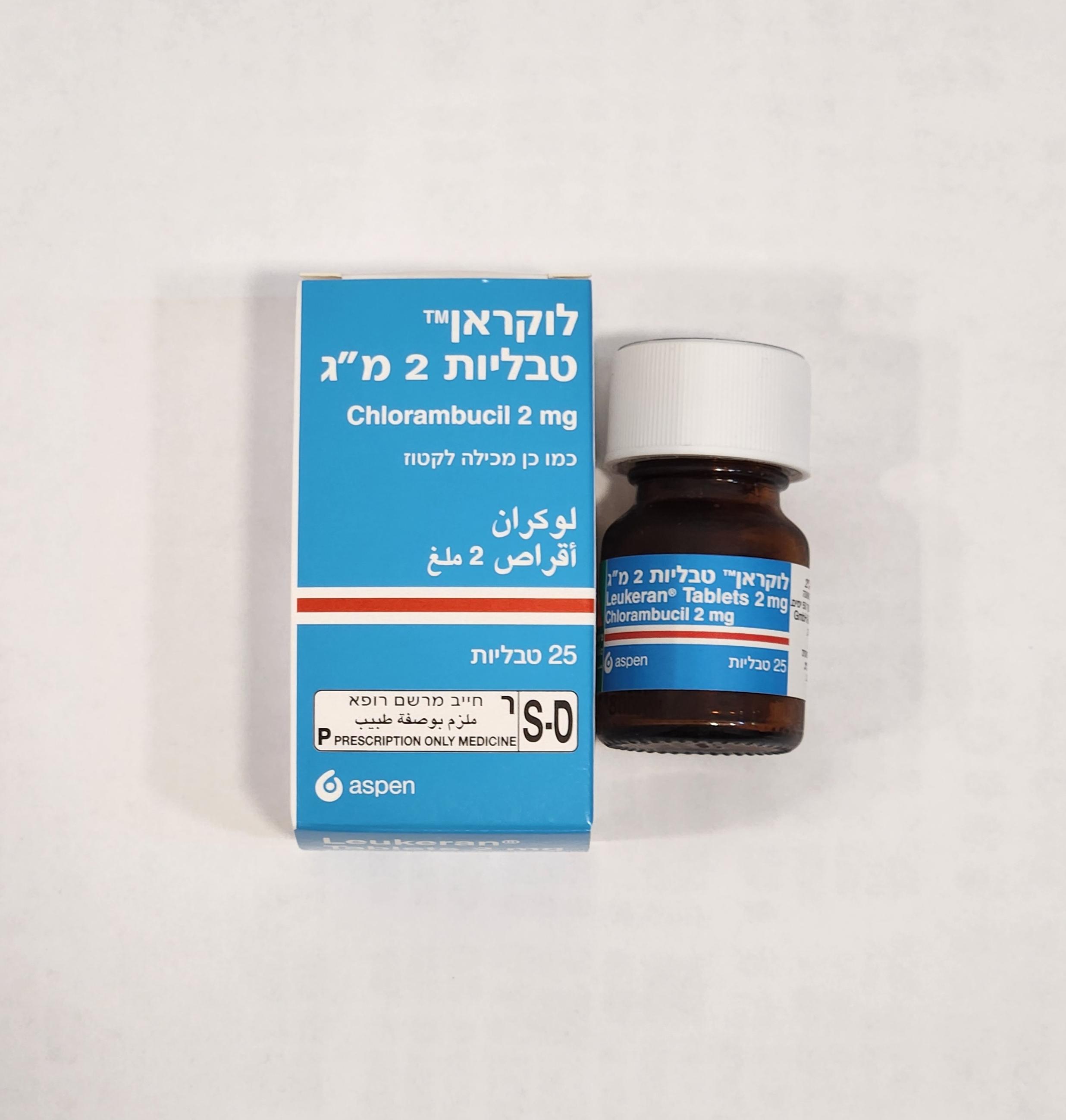Quest for the right Drug

לוקראן טבליות 2 מ"ג LEUKERAN TABLETS 2 MG (CHLORAMBUCIL)
תרופה במרשם
תרופה בסל
נרקוטיקה
ציטוטוקסיקה
צורת מתן:
פומי : PER OS
צורת מינון:
טבליה : TABLETS
עלון לרופא
מינוניםPosology התוויות
Indications תופעות לוואי
Adverse reactions התוויות נגד
Contraindications אינטראקציות
Interactions מינון יתר
Overdose הריון/הנקה
Pregnancy & Lactation אוכלוסיות מיוחדות
Special populations תכונות פרמקולוגיות
Pharmacological properties מידע רוקחי
Pharmaceutical particulars אזהרת שימוש
Special Warning עלון לרופא
Physicians Leaflet
Pharmacological properties : תכונות פרמקולוגיות
Pharmacodynamic Properties
5.1 Pharmacodynamic properties Pharmacotherapeutic group: Antineoplastic and immunomodulating agents, antineoplastic agents, alkylating agents, nitrogen mustard analogues ATC code: L01AA02 Mechanism of action Chlorambucil is an aromatic nitrogen mustard derivative which acts as a bifunctional alkylating agent. In addition to interference with DNA replication, chlorambucil induces cellular apoptosis via the accumulation of cytosolic p53 and subsequent activation of an apoptosis promoter (Bax). Pharmacodynamic effects The cytotoxic effect of chlorambucil is due to both chlorambucil and its major metabolite phenylacetic acid mustard (see section 5.2). Mechanism of resistance Chlorambucil is an aromatic nitrogen mustard derivative and resistance to nitrogen mustards has been reported to be secondary to: alterations in the transport of these agents and their metabolites via various multi-resistant proteins, alterations in the kinetics of the DNA cross-links formed by these agents and changes in apoptosis and altered DNA repair activity. Chlorambucil is not a substrate of multi-resistant protein 1 (MRP1 or ABCC1), but its glutathione conjugates are substrates of MRP1 (ABCC1) and MRP2 (ABCC2).
Pharmacokinetic Properties
5.2 Pharmacokinetic properties Absorption Chlorambucil is well absorbed by passive diffusion from the gastrointestinal tract and is measurable within 15-30 minutes of administration. The bioavailability of oral chlorambucil is approximately 70% to 100% following administration of single doses of 10-200 mg. In a study of 12 patients administered approximately 0.2 mg/kg of oral chlorambucil, the mean dose adjusted maximum plasma concentration (492 ± 160 nanograms/ml) occurred between 0.25 and 2 hours after administration. Consistent with the rapid, predictable absorption of chlorambucil, the inter-individual variability in the plasma pharmacokinetics of chlorambucil has been shown to be relatively small following oral dosages of between 15 and 70 mg (2-fold intra-patient variability, and a 2-4 fold interpatient variability in AUC). The absorption of chlorambucil is reduced when taken after food. In a study of ten patients, food intake increased the median time to reach Cmax by greater than 100%, reduced the peak plasma concentration by greater than 50% and reduced mean AUC (0-∞) by approximately 27% (see section 4.2). Distribution Chlorambucil has a volume of distribution of approximately 0.14-0.24 L/kg. Chlorambucil covalently binds to plasma proteins, primarily to albumin (98%), and covalently binds to red blood cells. Biotransformation Chlorambucil is extensively metabolised in the liver by monodichloroethylation and β-oxidation, forming phenylacetic acid mustard (PAAM) as the major metabolite, which possesses alkylating activity in animals. Chlorambucil and PAAM degrade in vivo forming monohydroxy and dihydroxy derivatives. In addition, chlorambucil reacts with glutathione to form mono- and diglutathionyl conjugates of chlorambucil. Following the administration of approximately 0.2 mg/kg of oral chlorambucil, PAAM was detected in the plasma of some patients as early as 15 minutes and mean dose adjusted plasma concentration (Cmax) of 306 ± 73 nanograms/ml occurred within 1 to 3 hours. Elimination The terminal phase elimination half-life ranges from 1.3-1.5 hours for chlorambucil and is approximately 1.8 hours for PAAM. The extent of renal excretion of unchanged chlorambucil or PAAM is very low; less than 1% of the administered dose of each of these is excreted in the urine in 24 hours, with the rest of the dose eliminated mainly as monohydroxy and dihydroxy derivatives.

שימוש לפי פנקס קופ''ח כללית 1994
Chronic lymphocytic leukemia, Non Hodgkin's lymphoma, Hodgkin's disease
תאריך הכללה מקורי בסל
01/01/1995
הגבלות
תרופה שאושרה לשימוש כללי בקופ'ח
מידע נוסף
